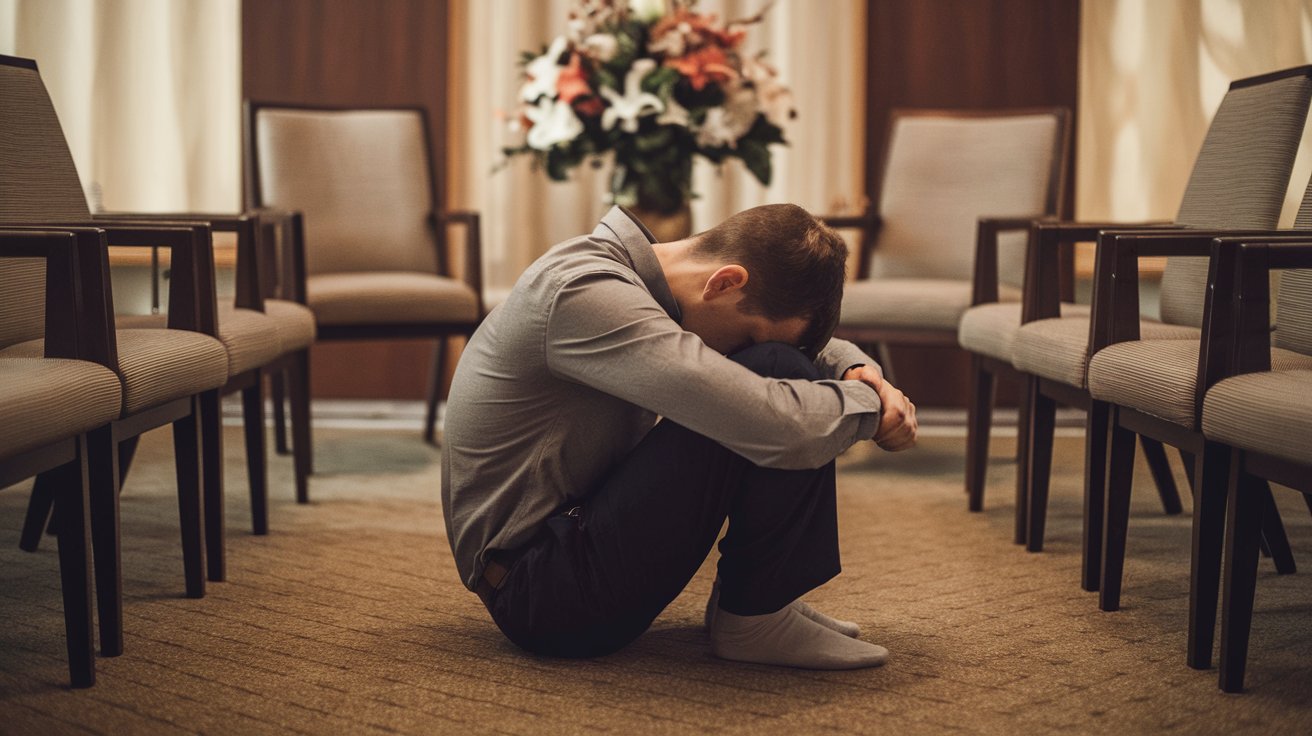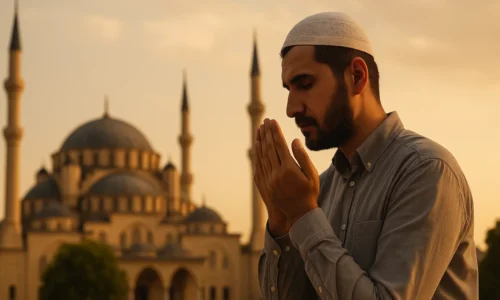In Islam, when someone dies or when we hear any bad news, we say special words. We say “Inna lillahi wa inna ilayhi raji’un” (إِنَّا لِلَّٰهِ وَإِنَّا إِلَيْهِ رَاجِعُونَ). This means “We belong to Allah and we will go back to Allah.” These words help us remember that everything in life comes from Allah. The good things and the hard things are all from Allah, and we all go back to Allah one day.
Muslims say these words most when someone dies. But we also say them when other bad things happen. It helps us be patient and accept what happens in life.
When someone dies, we should help their family. This is not just something nice to do. It is something Allah wants us to do. When we help sad families, Allah gives us good rewards. Our kind words and actions help the sad family feel better. This also makes all Muslims feel closer to each other.
As Muslims, we should know how to help when someone dies. We need to know what to say and what to do. This helps us do what Allah wants. It also helps us make the sad family feel better when they need help the most.
Islamic Perspective on Death
Death in Islam is not viewed as the end, but rather as a transition from this temporary life to the eternal life of the Hereafter. Our religion teaches us that every soul shall taste death, as mentioned in the Quran: “Every soul will taste death, and you will only be given your full compensation on the Day of Resurrection.” This understanding helps us accept death as a natural part of Allah’s plan.
When we hear of someone’s passing, we say “Inna lillahi wa inna ilayhi raji’un” (إِنَّا لِلَّٰهِ وَإِنَّا إِلَيْهِ رَاجِعُونَ). These words remind us that we all belong to Allah and will return to Him. This phrase brings comfort and helps us remember that our time in this world is temporary, and our ultimate destination is with our Creator.
Proper Ways to Offer Condolences
In Islam, visiting the bereaved family is highly encouraged. The best time to visit is soon after hearing the news of death, ideally within the first three days of mourning. However, if you cannot visit immediately, it is still beneficial to offer condolences later.
When visiting, it’s important to be respectful and composed. Speak softly and offer genuine sympathy. Some appropriate phrases to use include:
- “May Allah forgive him/her and grant them Jannah (Paradise)”
- “May Allah grant you patience and ease your suffering”
- “May Allah give you strength during this difficult time”
Actions to Support the Grieving Family
One of the most practical ways to support a grieving family is to provide food. In Islamic tradition, it is recommended for neighbors and community members to prepare meals for the bereaved family for the first few days. This allows them to focus on their grief and receiving visitors without worrying about daily tasks.
Emotional support can be offered by:
- Being a good listener
- Sharing positive memories of the deceased
- Offering to help with errands or childcare
- Making dua (supplication) for both the deceased and their family
The general mourning period in Islam is three days, except for a widow who observes iddah for four months and ten days. During this time, regular support and visits are encouraged.
Things to Avoid
When offering condolences, there are certain behaviors to avoid:
- Do not engage in idle talk or laughter
- Avoid saying phrases like “It was his/her time” or “It was meant to be”
- Don’t pressure the family to “be strong” or “stop crying”
- Refrain from discussing inheritance or financial matters immediately
Common mistakes people make include:
- Visiting at inappropriate hours
- Staying too long when the family needs rest
- Making comparisons with their own experiences of loss
Long-term Support
After the initial days of mourning, many people tend to forget about the bereaved family. However, the pain of loss often increases when the initial rush of visitors ends. Consider:
- Checking in regularly through calls or visits
- Including the family in social gatherings
- Continuing to make dua for the deceased, as this benefits them in the grave
Ways to remember the deceased include:
- Giving charity on their behalf
- Teaching others about their good qualities
- Maintaining good relationships with their family and friends
Remember, offering sincere condolences and support is not just a social courtesy in Islam, but an act of worship that brings rewards from Allah.
What Our Prophet Said About Helping Sad Families
Our Prophet Muhammad was very kind. When people were sad because someone died, he helped them. He showed us what to do when someone dies.
One time, the Prophet’s friend Ja’far died. The Prophet said to his other friends, “Make food for Ja’far’s family. They are too sad to cook.” This shows us we should help with easy things like making food.
Another time, when the Prophet’s own son died, he cried. His friends saw this and asked why. He said, “The eyes cry and the heart is sad, but we only say what makes Allah happy.” This means it’s okay to cry when we are sad.
The Prophet also said that when we help someone who is sad, Allah will help us when we are sad. This is why being kind to sad families is very good.
Good Words to Say to Sad Families
Sometimes it’s hard to know what to say to people when someone dies. Here are some good things you can say:
- “May Allah give your loved one a good place in heaven”
- “I am very sorry for your loss”
- “We are here to help you if you need anything”
- “Your loved one was a very good person”
- “May Allah make this easy for you”
Being Patient When Bad Things Happen
In Islam, being patient is very important. Allah tells us in the Quran that He is with people who are patient. When someone we love dies, we need to be patient.
Patience doesn’t mean we can’t be sad. It means:
- We know that Allah has a plan
- We try to be strong even when we are very sad
- We remember that we will see our loved ones again in heaven
How to Help People Learn Patience
When you talk to someone who lost a family member, you can help them be patient. Say things like:
- “Allah is with you”
- “Take your time to feel better”
- “It’s okay to be sad”
- “We are here to help you”
What to Do for a Long Time After Someone Dies
Most people help right after someone dies. But sad families need help for a long time. You can:
- Call them after some days
- Ask if they need help with anything
- Remember them in your prayers
- Talk about good memories of the person who died
This way, the family knows people still care about them. They don’t feel alone with their sadness.










